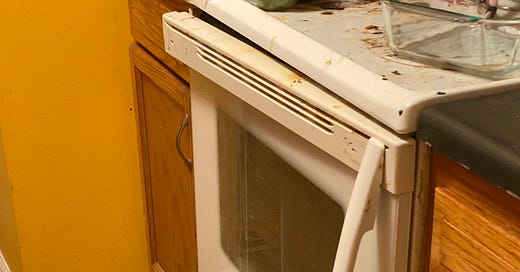We had a thanksgiving without bread. I had two different kinds of yeast but I could not for the life of me get the rolls to rise. I tried three different batches. I tried with eggs and without. I tried different fats. I tried everything I could think of and still the damn things failed every time. I realized, at some point, that it’s not muscle memory anymore; three years ago I made bread twice a week and didn’t even need a recipe but no matter how I drilled my brain this week I couldn’t seem to remember how.
I found myself frustrated by the lack of rhythm I had in the kitchen, as though I was trying to speak a language I used to be fluent in but couldn’t quite manage now without a dictionary. I used to stand and prep food for hours and it was magic how it all came together. I can cook ten things at once like I can breathe, and it’s a point of pride. At least I used to be able to. Now it’s much more like breathing underwater.
Cooking, at its very core, is half art and half science. You need to know chemistry and physics and biology and alchemy to cook from scratch, to start with a table bursting with raw ingredients and turn them into a feast. Sweet potatoes cook differently than yellow potatoes do because they contain different levels of starch, for example, and always add garlic last because it scorches first. Extra virgin olive oil has a different smoke point than light oil, which again behaves differently under heat than peanut oil does.
To cook by feel is to know all these things. Out of bread flour? That’s fine, just add some baking powder. Not enough collard greens but you bought beets? Use those greens too and call it a medley. I feel at home in a kitchen because it is constantly shifting chaos, because there is always a mishap of some sort which will create a puzzle you must solve. There are guidelines but no rules, which is how true artists create signature dishes out of common things; I put nutmeg and mustard in my creamed spinach which makes it not quite like anyone else’s. There is no way to rank my recipe against anyone else’s because there is no one right way to make that dish; it succeeds if it’s spinach with cream and the rest is all palate and creativity.
I love the decadence of textures possible with food. You start with powders and nuts and produce and milk and meat and depending on how you chop and heat it all you can make things that melt or burst or crunch in someone’s mouth. When someone eats your food and it makes them half-lidded, it is satisfying in the way that few pleasures are. Sex, maybe, or a perfectly sung high point in an aria. It is one of the thick velvet things in life, and one of the fleeting ones as well.
I cooked for two days to feed twenty-five people or so. I used thirty Pyrex dishes and ten foil pans. I tore through fifty-two pounds of produce and ten pounds of flour and three gallons of milk and cream. There are no leftovers barring one forgotten pan of stuffing and one industrial sized pan of mac and cheese; even the carcasses were picked so clean they were ready to be made into broth with no extra work. Two days of back pain and flaring sciatica and burned fingers and a growing sense of resignation because here again is something I can’t do anymore without help, and all of it was gone in under two hours.
Some people resent that workload to return ratio, because once the food is eaten the cleaning begins. I know a lot of people don’t enjoy cooking in the way that I hate running; it does not come naturally and is often painful. We can all push through pain for the things we truly find valuable, the things our brains reward us for. Even I found myself slightly resentful this year because I had to push past so much more pain than I’m used to, because my body won’t allow me to put in six solid hours of work without taking a dozen breaks to rest my back or my hip.
But the goal with large meals is the gathering and the eating and the company and the love of it all, none of which happens without a lot of pain and work in preparation. Joy is always hard-won and this year more than most as we navigate gathering with people missing, people we thought we’d have for years yet and are gone now. People we’ve lost touch with while we all grappled with isolation. People we don’t speak to anymore because we have realized that we are not as similar as we’d previously thought. We are mired in grief in myriad ways.
It magnifies the joy. It does not erase the grief but it is a balm to pain, and for two hours on Thursday a few dozen people ate and drank and the kids had sparkling cider and the grownups had mulled wine and by the time we were done I had forgotten my pain.
Food can do that







